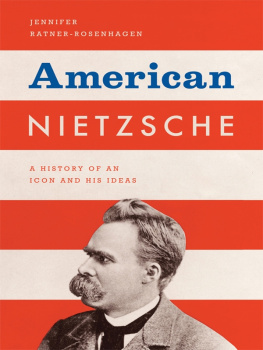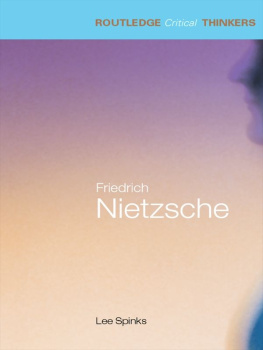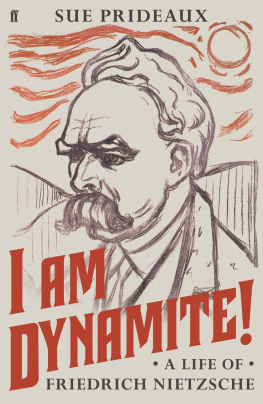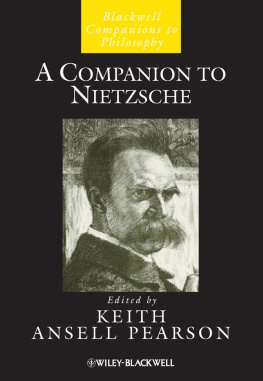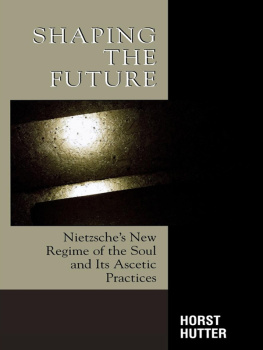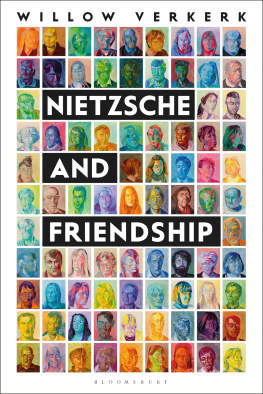About the Author
Andr van der Braak is associate researcher at the department of Philosophy at Radboud University, Nijmegen. He has been a member of the Nietzsche Research Group in Nijmegen since 1998 and is a coworker of the Nietzsche Dictionary Project. He is the author of Enlightenment Blues (Monkfish Publishing 2003), Hoe men wordt, wat men is: Zelfvervolmaking, zelfover-winning en zelfvergetelheid bij Nietzsche [How One Becomes, What One Is: Self-cultivation, Self-overcoming and Self-forgetting in Nietzsche] (Damon 2004), Goeroes en charisma [Gurus and Charisma] (Altamira 2006), and various articles on Western and Buddhist philosophy. From 2007 to 2009, he served as a director of the Dutch Philosophy East West Foundation.
Acknowledgments
This study could not have been completed without the generous support of the Stichting Pierson Filosofie. I am very grateful to them for providing time for research and writing through their financial support. Chairman Bruno Nagel has especially been a source of much encouragement and good advice throughout the project.
This work has been in progress since 2004. It was born during a short stay at the Nanzan Center for Religion and Culture in Nagoya, Japan. Thanks to Tom Kasulis and Jim Heisig for their encouragement of the project. Over the years, my colleagues at the Comparative and Continental Philosophy Circle (David Jones, Bret Davis, Jason Wirth, Brian Schroeder, Ann Pirrucello, Tim Freeman, Michael Schwartz) have provided much support and encouragement.
This study followed on directly from my Nietzsche dissertation (How One Becomes, What One Is). Paul van Tongeren, my Ph.D. supervisor, continued to encourage me to extend my research into a comparative direction. The monthly seminars of his Nietzsche Research Group in Nijmegen have provided since 1998 a very lively philosophical environment for my Nietzsche research. I have greatly benefited from being able to present early versions of several chapters of this study in the seminars. I am grateful to Paul Carls and Wolter Hartog for their detailed reports of those seminar meetings, and to Isabelle Wienand for helping me to review the French language material on Nietzsche and Buddhism.
Thanks to Michael Skowron for reading an early draft of the entire manuscript. The anonymous reviewer for Lexington Books (who revealed himself, through his style and his acquaintance with the topic of Nietzsche and Zen, to be Graham Parkes) provided excellent suggestions for revisions and stylistic restructuring.
My own philosophical sksis has included the practice of Buddhist meditation since 1981. Gassho to my Dutch Zen teachers Nico Tydeman and Ton Lathouwers for their continuous support and encouragement. Teaching Zen (especially Dgen) to the students of Zen Center Amsterdam has provided much inspiration for writing this book. Thanks to Henny van der Veere, lecturer in Japanese Religions at Leiden University, for his continuous deconstruction of Zen myths during several Classical Chinese reading groups.
An early version of some of the material in chapter 6 and 7 appeared as Nietzsche and Japanese Buddhism on the Cultivation of the Body: To What Extent Does Truth Bear Incorporation? in Comparative and Continental Philosophy, volume 1.2 2009, 223251 (c) Equinox Publishing Ltd 2009. I am grateful to Equinox Press for permission to reprint that material here.
Epilogue
Toward a Philosophy of the Future
The dialogues in this study between Nietzsche and various Zen thinkers can open up new perspectives on what an sksis of a philosophy of the future could look like. The dialogue between Nietzsche and Ngrjuna has elucidated the skepticism in both thinkers. It suggests that Nietzsches skepticism should be interpreted in light of his Dionysian philosophy and that Ngrjunas skepticism should not only be studied through a Pyrrhonian, but also through a Nietzschean lens. Linjis Zen deconstruction has shown itself to be in line with Nietzsches active nihilism. However, when Linjis followers reify Zen as a direct transmission beyond words and letters, they diverge from Nietzsche. The temptation then arises to view enlightenment as a redemptive state beyond thought and language, a liberation from ignorance and delusion.
Dgens Buddhist revaluation of values brings Zen closer to Nietzsche again. Dgens sksis stresses continuous self-overcoming, not attaining some kind of static and final state of redemption. Both Dgen and Nietzsche take a soteriological term from their own native religious tradition (for Nietzsche, Christian redemption, for Dgen, Buddhist enlightenment), criticize its orthodox meaning as a final state beyond suffering, purge it of its metaphysical and transcendent connotations, and revalue its meaning out of a thoroughly this-worldly orientation. Rather than present a new version of the Zen experience as a new attempt at radical transcendence or a new conception of religious experience, Dgens immanent transcendence, his radical phenomenalism, can serve to overcome the implicit dichotomies in Western modes of thought between inner and outer, mind and body, meditation and ritual, individual and society, spiritual and secular, and religious life and ordinary life.
Nishitani has done much for the dialogue between Nietzsche and Zen. However, his Heideggerian interpretation of the will to power has put a premature conclusion to the dialogue. Interpreting the will to power as upya allows us to continue the dialogue. Also, Nishitanis approach of measuring Nietzsche against the Zen standard of emptiness can be complemented with measuring Zen against the standard of Nietzsches thought. In this way, the dialogue with the philosopher with the hammer may perhaps contribute to the realization of a different, more Nietzschean Zen for the West that can assist in Nietzsches project of revaluation of all values.
For Nietzsche, overcoming the European philosophical tradition was not a goal in itself; the purpose was to remove the barriers for a more encompassing world philosophy:
I imagine future thinkers in whom European-American indefatigability is combined with the hundredfold-inherited contemplativeness of the Asians: such a combination will bring the riddle of the world to a solution. In the meantime the reflective spirits have their mission: they are to remove all barriers that stand in the way of a coalescence of human beings. (KSA 8, 17 [55])
May the dialogue between Nietzsche and Zen continue, not so much in order to bring the riddle of the world to a solution, but in order to contribute to a Way-seeking philosophy and a coalescence of human beings.
Bibliography
Abe, Masao. Zen and Western Thought. Honolulu: University of Hawaii Press, 1985.
. A Study of Dgen: His Philosophy and Religion. Albany: State University of New York Press, 1992.
Addiss, Stephen, Stanley Lombardo, and Judith Roitman, eds. Zen Sourcebook:Traditional Documents from China, Korea, and Japan. Indianapolis/Cambridge: Hackett Publishing Company, 2008.
Alderman, Harold. Nietzsches Gift. Athens: Ohio University Press, 1977.
Ames, Roger T. Nietzsches Will to Power and Chinese Virtuality (De): A Comparative Study. In Nietzsche and Asian Thought, edited by Graham Parkes, 3050. Chicago: University of Chicago Press, 1991.
Arifuku, Kogaku. The Problem of the Body in Nietzsche and Dgen. (translated by Graham Parkes). In Nietzsche and Asian Thought, edited by Graham Parkes, 21425. Chicago: Chicago University Press, 1991,
Aschheim, Steven E. The Nietzsche Legacy in Germany: 18901990. Berkeley: University of California Press, 1990.
Bazzano, Manu. Buddha is Dead: Nietzsche and the Dawn of European Zen




